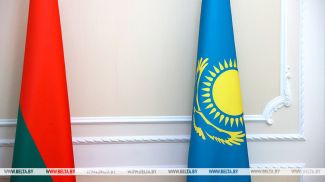MINSK, 28 November (BelTA) – Belarus President Aleksandr Lukashenko signed decree No.411 on 28 November to approve the most important parameters of Belarus' social and economic development forecast for the year 2023, BelTA has learned.
In particular, the growth rate of the gross domestic product is expected to reach 103.8% as against 2022. The growth rate of the real disposable income of the population is expected at 104.1%, fixed-capital investments – 122.3%, export of merchandise and services – 105.5%.
In order to hit the social and economic development targets, the government will adopt a plan. It will concentrate all the measures and resources needed for the uninterrupted and effective operation of organizations amid sanctions. The measures will also be aimed at raising living standards of the population.
Fixed-capital investments are viewed as the main driver of Belarusian economy growth next year. Investments will be poured into three areas.
As much as Br7.7 billion will be invested in building housing and the appropriate infrastructure. There are plans to build 4.3 million m2 of housing, including 1.3 million m2 of housing with state support and at least 735,000m2 of rental housing.
As much as Br7.9 billion will be invested in the creation and development of infrastructure in the regions. There are plans to build 17 preschool institutions for kids, 9 secondary education institutions, 22 physical education and recreation complexes, 7 swimming pools, 21 sport facilities, 46 healthcare institutions, 22 bridges and overpasses on major motorways and 30 bridges and overpasses on municipal roads.
As much as Br31.2 billion will be poured into investment projects and retooling. There are plans to realize 129 investment projects, 14 integration projects, and 51 import-substitution manufacturing projects.
In order to hit the economic growth target in 2023, Belarus' export is supposed to reach $47.7 billion, with the growth rate at 105.5%.
The government intends to compensate for the loss of export to Western countries and Ukraine by stepping up presence on the markets of Russia, China, the Middle East, Central Asia, and Africa.
There are plans to increase shipments to Russia by 6.5%, to China by 15%, to Africa by 10%.
As a result, foreign trade surplus is expected to reach $1.6 billion. It will ensure the balanced state of the balance of payments and will have a positive effect on maintaining the country's economic security at a proper level.
The nominal accrued average monthly salary will be Br1,938 in the economy as a whole and Br1,454 in the public sector.













